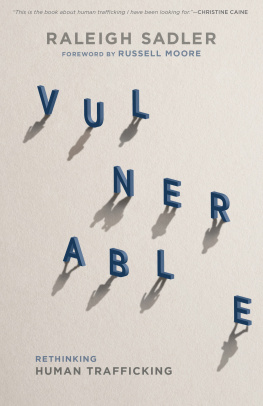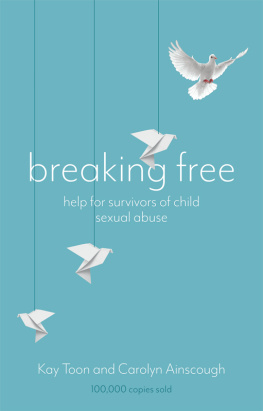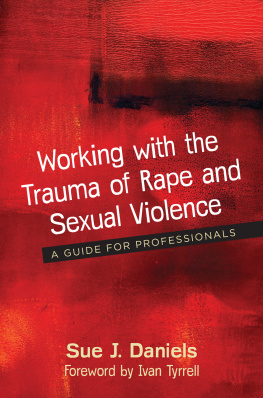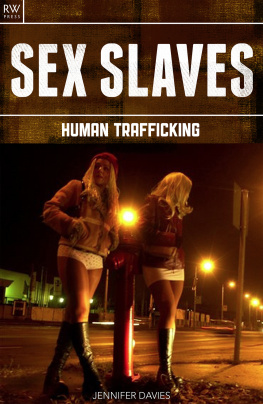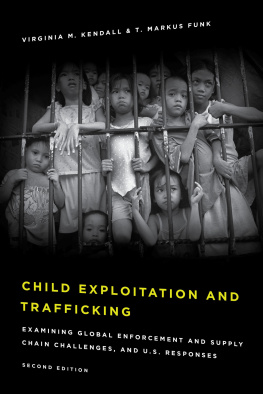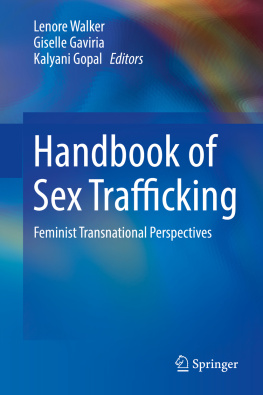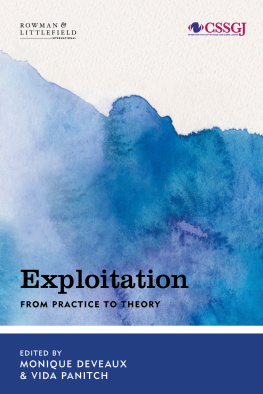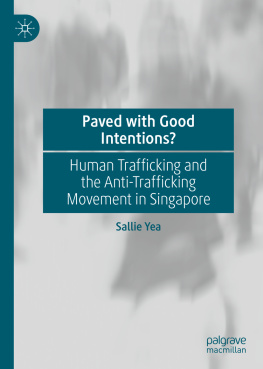SOCIAL WORK PRACTICE WITH SURVIVORS OF SEX TRAFFICKING AND COMMERCIAL SEXUAL EXPLOITATION
Columbia University Press
Publishers Since 1893
New York Chichester, West Sussex
cup.columbia.edu
Copyright 2018 Columbia University Press
All rights reserved
E-ISBN 978-0-231-54336-1
Library of Congress Cataloging-in-Publication Data
Names: Nichols, Andrea J., editor. | Edmond, Tonya, editor. | Heil, Erin C., editor.
Title: Social work practice with survivors of sex trafficking and commercial sexual exploitation / edited by Andrea J. Nichols, Tonya Edmond, and Erin C. Heil.
Description: New York : Columbia University Press, [2018] | Includes bibliographical references and index.
Identifiers: LCCN 2017041358 (print) | LCCN 2017048897 (ebook) | ISBN 9780231543361 | ISBN 9780231180924 (hardback : alk. paper) | ISBN 9780231180931 (pbk.)
Subjects: LCSH: Human trafficking victimsServices for. | ProstitutesServices for. | Social work with prostitutes.
Classification: LCC HQ281 (ebook) | LCC HQ281 .S745 2018 (print) | DDC 306.74dc23
LC record available at https://lccn.loc.gov/2017041358
A Columbia University Press E-book.
CUP would be pleased to hear about your reading experience with this e-book at .
Cover design: Jordan Wannemacher
CONTENTS
ANDREA J. NICHOLS, PhD, WASHINGTON UNIVERSITY IN ST. LOUIS
ERIN C. HEIL, PhD, SOUTHERN ILLINOIS UNIVERSITY EDWARDSVILLE
MELANIE WEAVER, MFA, ARTIST ACTIVIST, 38+ YEAR SURVIVOR, PhD STUDENT, ARIZONA STATE UNIVERSITY
REBECCA J. MACY, MSW, PhD, UNIVERSITY OF NORTH CAROLINA AT CHAPEL HILL
AMBER SUTTON, MSW, LMSW, SAFEHOUSE OF SHELBY COUNTY
ABBY HOWARD, MSW, LCSW, UNIVERSITY OF DENVER
RACHEL LLOYD, MA, SURVIVOR; FOUNDER AND PRESIDENT, GEMS
TONYA EDMOND, MSW, PhD, WASHINGTON UNIVERSITY IN ST. LOUIS
KATHLEEN M. PREBLE, PhD, MSW, UNIVERSITY OF MISSOURICOLUMBIA
LYNLY S. EGYES, ESQ., THE SEX WORKERS PROJECT
LAURIE COOK HEFFRON, PhD, LMSW, ST. EDWARDS UNIVERSITY
VALANDRA, PhD, MSW, LCSW, UNIVERSITY OF ARKANSAS
ANDREA J. NICHOLS, PhD, WASHINGTON UNIVERSITY IN ST. LOUIS
JOAN A. REID, PhD, LMHC, UNIVERSITY OF SOUTH FLORIDA ST. PETERSBURG
JULIA STRAUSS, GRADUATE STUDENT, VANDERBILT UNIVERSITY, REGISTERED BEHAVIOR TECHNICIAN
RACHAEL A. HASKELL, PhD, LCSW, UNIVERSITY OF SOUTH FLORIDA ST. PETERSBURG
SANDRA BLOOM, MD, DREXEL UNIVERSITY
LARA B. GERASSI, PhD, MSW, LCSW, UNIVERSITY OF WISCONSIN MADISON
ABBY HOWARD, MSW, LCSW, UNIVERSITY OF DENVER
JOAN A. REID, PhD, LMHC, UNIVERSITY OF SOUTH FLORIDA ST. PETERSBURG
MAURA NSONWU, PhD, MSW, LCSW, NORTH CAROLINA AGRICULTURAL AND TECHNICAL STATE UNIVERSITY
LAURIE COOK HEFFRON, PhD, LMSW, ST. EDWARDS UNIVERSITY
CHIQUITIA WELCH-BREWER, PhD, NORTH CAROLINA AGRICULTURAL AND TECHNICAL STATE UNIVERSITY
NOL BRIDGET BUSCH-ARMENDARIZ, PhD, LMSW, MPA
LISA GOLDBLATT GRACE, LICSW, MPH, COFOUNDER AND EXECUTIVE DIRECTOR, MY LIFE MY CHOICE
KATHERINE BRIGHT, MA, RESEARCH ASSISTANT, MY LIFE MY CHOICE
AMY CORBETT, LMHC, DIRECTOR OF PREVENTION, MY LIFE MY CHOICE
AUDREY MORRISSEY, ASSOCIATE DIRECTOR, MY LIFE MY CHOICE
ANDREA J. NICHOLS, PhD, WASHINGTON UNIVERSITY IN ST. LOUIS
LAUREN S. PEFFLEY, MSW, EDENS GLORY
ANDREA J. NICHOLS, PhD, WASHINGTON UNIVERSITY IN ST. LOUIS
ANDREA J. NICHOLS, PhD, WASHINGTON UNIVERSITY IN ST. LOUIS
ANDREA J. NICHOLS, PhD, WASHINGTON UNIVERSITY IN ST. LOUIS
ERIN C. HEIL, PhD, SOUTHERN ILLINOIS UNIVERSITY, EDWARDSVILLE
S ex trafficking has increasingly become an area of public concern and activism. Despite this heightened attention, sex trafficking and commercial sexual exploitation (CSE) are not well understood in the public and political spheres, even within the antitrafficking movement and among social workers. In particular, there is a gap in the collective knowledge related to social work practice with survivors of sex trafficking and CSE. For this reason, it becomes more important than ever to disseminate knowledge from survivors, practitioners, and researchers in order to advance such knowledge and practice techniques in this field. With heightened public and political attention, our understandings of sex trafficking have shifted, but our practice knowledge lags behind.
Societys changing perceptions of sex trafficking are rooted in a history of grassroots activism and the resulting legislative shifts (Boxill & Richardson, 2007; Kalergis, 2009; Nichols, 2016). While sex trafficking has always existed, albeit under different labels (such as commercial sexual exploitation or, in the justice system, juvenile prostitution), redefining sex trafficking through key legislation and activism created a shift in the justice system, in practice, and in academia. According to federal law, sex trafficking is the recruitment, harboring, transportation, provision, obtaining, patronizing, or soliciting of a person for the purposes of a commercial sex act, in which the commercial sex act is induced by force, fraud, or coercion, or in which the person induced to perform such an act has not attained 18 years of age (22 U.S.C. 7102). Simply put, under U.S. federal law, any commercial sex act involving a minor equates to sex trafficking; for adults, commercial sex under conditions of force, fraud, or coercion is considered sex trafficking.
Yet researchers and practitioners report limitations to this definition, in that the service population involved in commercial sex extends beyond the legal criteria for sex trafficking. This population includes adults involved in commercial sex who do not experience force, fraud, or coercion (or are unable or unwilling to report it), who experience difficulty in accessing services, and who often face criminalization instead of assistance (Egyes, 2016; Gerassi, Nichols, & Michelson, 2017; Heil & Nichols, 2015; Oselin, 2014). Some researchers refer to CSE as commercial sex involvement as a constrained choice, or as a situation in which some vulnerability is being exploited, such as age (e.g., minors), intellectual disability, poverty, or homelessness (Nichols, 2016; Reid, 2011). Legally, CSE is inherently sex trafficking if a minor is involved (Lloyd, 2012). For adults, it is not sex trafficking unless force, fraud, or coercion is present. Other researchers refer to this grey area population as sex workers, some of whom are involved as a free choice but others are involved as a constrained choice (Egyes, 2016). This book focuses on sex trafficking but also on the wider service population involved in commercial sex.
The authors of this book have different experiences and ideologies. Some prefer the legal language of sex trafficking, and others prefer commercial sexual exploitation, sex work, or some combination of terms. The editors believe that it is important that various knowledge bases speak for themselves and reflect the reality of the various ideologies present within the field at large. Service providers can analyze their own approaches to understand how their biases might impact their work with survivors. As will be seen in various parts of this book, mirroring the language that survivors use is extremely important, and it is also important to create a nonjudgmental environment respecting how they view and interpret their situations. People accessing various types of services may not identify with the terms


